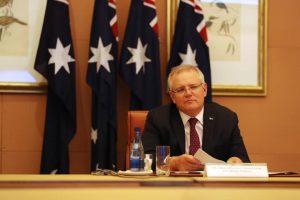The Australian government is set to introduce legislation that would give the federal government a veto over any deals that state and territory governments, as well as local councils and universities, make with foreign governments. Prime Minister Scott Morrison stated that this legislation is not targeted at any specific country and will give the federal government the power to review any deals that these entities make to ensure they are consistent with Australia’s foreign policy. However, it is obvious that China created the conditions for the creation of this legislation, and it signals a further willingness by Canberra to push back against Beijing’s influence operations.
Although the legislation is aimed at addressing concerns across a number of sectors, the impetus for its creation was the Victorian state government’s decision to sign a “framework agreement” with China’s Belt and Road Initiative (BRI) as a component of its “Big Build” infrastructure push. The agreement also signposts future collaboration on research across a number of fields, and cooperation in biotechnology and high-end manufacturing, areas that have the potential to have serious national security implications.
The Victorian government has promoted the agreement as one beneficial to creating jobs in the state, and improving the export potential of Victorian businesses. While this is an understandable intention, the Victorian government hasn’t recognized how signing up to an initiative that is part of China’s strategic goals to enhance its power over other states would undermine Australia’s own foreign policy objectives. There was also a certain naivety to not consider that the Chinese government could be seeking to weaken Australia’s federation, turning its levels of government against each other.
One of the advantages of a federation is the ability for state governments to act with a certain independence to find opportunities that a central government may be unaware of, or overlook. This is especially the case in a country like Australia where the most extensive political power may lie in Canberra, but its economic and cultural power lies in Melbourne and Sydney. However, the federal government has the right to expect a broadly coherent national approach to foreign engagements, and it develops its foreign policy specifically to best understand how these engagements should transpire. This is knowledge state governments may lack. The new legislation will formalize what should be an obvious approach to Australia’s division of powers.
The reason such legislation has been overlooked until now is that Australia has never before had a strategic competitor that was also its largest trading partner. This presents a unique set of circumstances that requires all levels of government — as well as important institutions such as universities — to be on the same page in order to guard against any potential security threats posed by the economic relationship, and the uneven balance of power between the two countries.
While this balance of power rightly concerns the Australian government, it has also demonstrated a recent willingness to not be intimidated by it, and to implement measures that aim to protect the country from Beijing’s growing reach. Alongside the new foreign relations legislation, Australia has adopted more stringent scrutiny toward foreign investment as well as establishing a taskforce to counter disinformation campaigns. Although these measures do not single out China as a concern, they are obviously driven by Chinese activity.
The Australian government’s approach to implement these guardrails has been one where it calmly, but firmly, explains its positions, and avoids provocative language. Although members of the government’s own backbench have been less restrained, the cabinet generally avoids bluster and hysterics. This approach is driven by an understanding that the Chinese government respects strength and consistency, it sees signs of weakness as opportunities to exploit, but it will pragmatically adjust itself to new realities if these are demonstrated to be positions that other governments are steadfast in their commitment to.
Australia has also understood that demonstrating its firm commitment to guard its national interests faces only limited pushback from China. Beijing has a habit of targeting certain industries to try to place pressure on Australia — this week it is wine — but the largest sources of export revenue — raw materials — are immune from this type of economic coercion. Indeed these are currently surging, as China is unable to efficiently and reliably source these materials from other countries.
The federal government taking the power to cancel agreements with other countries if they are inconsistent with Australia’s foreign policy is a recognition that it is the only level of government with has enough information to assess the potential difficulties that such agreements could create. The legislation is a recognition that global conditions are altering significantly at present, and for Australia to be able to successfully negotiate these changes it requires consistency in its foreign relations.

































